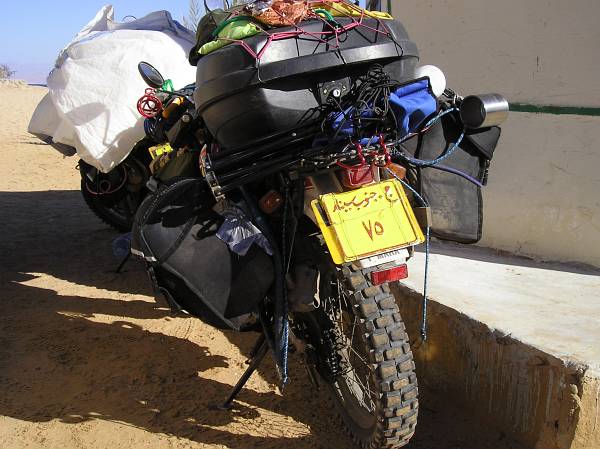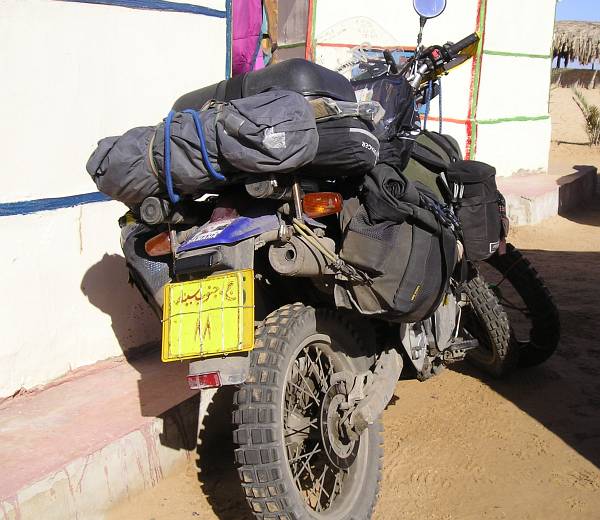New Numbers Please
And a new continent.
The Dark One.
Crossing the land border into Egypt with a vehicle has become a thing of legend in overland-traveller circles. Its notoriety spreading far and wide.
Specially when crossing by sea on the ferry.
One thing for sure, it's expensive.
Adding everything together, import carnet, ferry ticket, insurance, customs, photocopying, and things we can't now quite recall, for a cheapish motorbike it adds up to maybe £700, roughly. The single biggest expense, the carnet, is related directly to the valuation of the vehicle.
But as it turned out for our border crossing, its bark was worse than its bite and it actually had quite a bit of entertainment value.
And some quirkiness.
For instance, you come out the other end with a brand new, credit-card style plastic Egyptian driving license. But, in a process where you end up with two separate files of papers (hence the photocopying bill) to be shuffled and juggled by dozens of officials, at no time were any of us asked to produce or show a driving license, British, international or otherwise.
And of course, you get those legendary new shiny (or not so shiny) Egyptian number plates.
So Caroline is now the proud owner of registration number 75,

me of number 88,

and Beau of number 92. Wonderful!
(The photo I took of Beau's bike had the sun right on the number plate. But you get the idea.....
So briefly, I hope, other entertaining moments in the process - skip this lot if boring:
We opted for the cheaper ferry, which nominally leaves Aqaba at midnight, and nominally arrives in Nuweiba, Egypt, at a time unspecified the following morning.
But you have to leave Jordan first, before buying your ticket. Which involves the usual passport stuff, checking the temporary import paper and insurance for the bike, paying departure tax on both bike and person, buying ticket and having the whole lot re-checked on entering the vehicle holding area.
There, we were entertained by an endless procession of tour coaches doing a tight U-turn in the small space in front of us, to get into the right position so they could reverse onto the ferry once loading started.
It was a pretty tight U-turn, lots of tyre squealing, and one coach couldn't manage it. Although they were all modern coaches, pretty similar in size and layout, this one reached the halfway point in the turn then seemed to get stuck. Even though there was no obstruction. The engine revved, it lurched and lunged, but wouldn't complete the turn.
Then the command was shouted, all the passengers got out - and pushed.
That did the trick, and it was pushed all the way to its alloted holding spot.
What the problem was we'll never know. The engine was definitely running.
All these coaches - there were quite a few dozens of them, had only a half-load of passengers, sitting in the front half. The rear half was full of luggage, mostly, as far as I could make out, soft furnishings, bedding and childrens' toys.
With the waltz of the coaches completed, the few cars and us three bikes were ushered forward to within sight of the ship's loading ramp. Which we could see was broken.
It was wide enough for the biggest of trucks, made in 5 sections. One section was completely missing, a huge gap down into the Gulf of Aqaba.
A little way inside the ship's hold some serious welding was taking place, lighting up the whole interior, sparks bouncing around everywhere. Followed by deafening hammering and a complete firework display of more sparks as someone got to work with an industrial angle grinder.
Then the missing section was pulled along into view by three strapping dock workers obviously fed on Weetabix judging by the weight of this massive lump of steel.
Persuading it into place, with sledge hammers, crowbars and grappling irons took maybe a half hour, followed by half an hour of inspection, and half an hour of congratulatory handshaking all round by workers, supervisors and assorted men-in-suits.
While all this was going on we could see further into the vehicle deck, where yet another team of welders and grapplers were attacking one the internal car ramps, lighting up the deepest depths of the ferry with their welding torches.
This was one of those ferries where they load the big stuff (dozens of coaches) onto the deck at ground level, then lower a couple of ramps inside the hold so smaller stuff (cars and us bikes) can drive in and up the ramps to the upper vehicle deck.
But one ramp was stuck.
They had started to lower one of the two ramps earlier, but instead of it descending gently into place something broke and the whole thing came crashing down, but fortuitously into the right place. It made a pretty loud and thunderous racket, echoing round the deck, with all the support stays and struts quivering and wobbling. Now the ramp next to it was jammed solid and the welders were at work.
That took another chunk of time, followed by another congratulatory round of handshaking lasting maybe 15 minutes.
And at last it was time for the coaches to start reversing on. Pretty boring really, until one got stuck on the loading ramp. Maybe it was the same coach as before, I don't know, but it revved and lurched and wobbled and its rear tyres refused to go over a raised joint in the ramp. Even though dozens of coaches had driven over before.
All the coach passengers had by now left and made their way on board, so no help there. Instead, a couple of dock workers manfully stepped up to the front of the coach and pushed.
Now these coaches have engines of maybe 400 horsepower, so what difference two men thought they could make I don't know, but more joined in including the policeman who had chatted to us earlier. It was a mystery to me why this particular coach, empty of passengers, couldn't get over the bump, but about half an hour of revving and huffing and puffing and lurching saw it eventually get inside the boat.
And so it continued until us riders had our day, right at the back, and were last on.
We were well looked after. Being, I think, the only westerners on board. An official escorted us from the bikes to the passport checker on the passenger deck, who said to return to him after we had seen the Egyptian immigration officer. So we did, after noticing that just about every bit if seating and floor space had already been taken for the night.
"I have special place for you," said the passport checker as he took us to a door behind his desk labelled 'Crew Only'.
So there we were for the voyage in a large lounge area, completely empty except for the occasional official who came in to rummage for a few minutes in a small office in the corner.
We arrived in Nuweiba after about three hours actual sailing time. And we learned that another bit of folklore about this crossing was true; when the ship arrives, nothing happens. For over an hour.
The ramp is lowered, a rubbish cart taken away, then nothing.
After well over an hour, at some secret signal, passengers dissembarked and we were collected and escorted on the circuitous route back to our bikes. We would never have found them without assistance.
We rode onto African soil and immediately an official directed us to a pyramid-shaped building "for check, then go to Arrivals Shed." The pyramid is empty except for a solitary official at a solitary desk in the far corner. He wants to see our passports. Not inside them, just to see that we have one each.
"OK, continue to Arrivals Shed."
Puzzling.
On the way we saw an ATM so stopped to draw out the 1000 Egyptian Pounds that the next few hours would cost. Next door was the Tourist Police office.
The universal mantra nowadays for arriving in Egypt is "Straightaway, find a Tourist Policeman to take you through. You'll be ripped off with bribes and backhanders without." And it still seems true. A recent aquaintance, travelling the same route as us, went through a few weeks before us. Without, we think, the help of the police. He emailed us to warn he had been the victim of one of the classic carnet scams, which we thought he would have been aware of and wary of.
The insurance man had asked to see his carnet, which is OK, but tore off the lower section of the first unused page, which is not. He then stamped the top section of the next page, which is even worse, and later demanded a big sum of money for the return of the lower section previously torn off, which is the final sting. The carnet is rendered useless without this section being returned and the official knows it. Our friend paid, but didn't tell us how much. We hope it wasn't a lot. Other victims have written that they eventually get the section back by making a continuous fuss at the insurance window, elbows and shoulders spread wide to prevent other drivers completing their business so that the angry queue grows so long that the official is eventually forced to relent.
Not a pleasant business.
Anyway, we dived straight into the tourist police office and asked for assistance.
"Drive over to the arrivals shed, get parked, come back and I'll have someone ready," says the boss.
So we did, and he did. He collected all our papers including some we received on the ferry, checked everything was there and introduced one of his officers.
"Make good use of him, he'll see you through right to the end."
And over the next three hours he did just that. We've lost count of the number of officials we saw, the number of offices we marched in and out of, and the size our entry files grew to. But we stood at hardly any windows, usually going straight into the office and up to the person required, jumping all the queues.
This enabled us to observe other drivers a little, going through the same process. Mostly professionals, or regulars, coach drivers, lorry drivers, businessmen and so on. And it was obvious to us that each time a transaction in the process was completed at a window, and a file of papers handed back with all the stamps in the correct places, a banknote was handed in the other direction.
Obviously our personal policeman was saving us a lot of money, for no charge, and word on the travellers' forums is that a reasonably generous tip is in order at the end of the process. But our policeman was so keen to get to his next job that he dashed away before we really realised we were finished and we had to run after him to give him his well-deserved Christmas box!
So all in all it was not the horror story we had come to expect, but horrendously tiring nevertheless, if not an interesting educational experience. We arrived at the docks at Aqaba at around 9:30 in the evening, and finally left the docks at Nuweiba, onto Egyptian roads, at midday the following day.
We found a laid-back beach-hut mini-resort a little way north, one of many on the Sinai coast, so now we rest!
